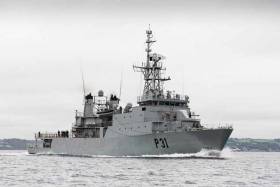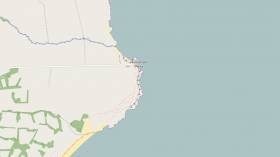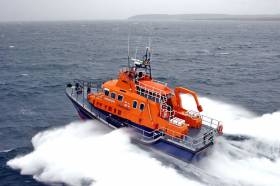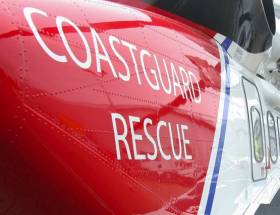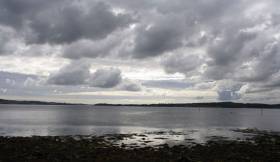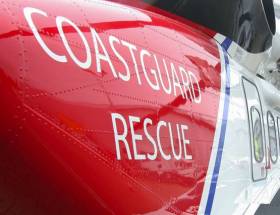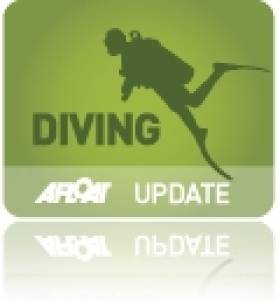Displaying items by tag: Search and Rescue
European Ombusdman Calls for Independent Inquiry Into Large Number of Mediterranean Deaths
A European Ombudsman inquiry into Frontex’s role in search and rescue operations says that the current rules leave the EU’s border and coast guard agency unable fully to fulfil its fundamental rights obligations.
The inquiry says Frontex has no internal guidelines on issuing emergency signals, such as Mayday calls, and it is too reliant on member states to act when boats carrying migrants are in distress.
The inquiry was initiated by Ombudsman Emily O’Reilly following the Adriana tragedy in June 2023, which resulted in over 600 people drowning off the coast of Greece.
The vessel is estimated to have been carrying up to 750 migrants, mostly from Pakistan, Syria, Palestine, and Egypt, and some from Afghanistan, when it sank in international waters in the Mediterranean on June 14th, 2023.
O’Reilly has called on the European Parliament, the Council of the European Union, and the Commission to establish an independent commission of inquiry to assess the reasons for the large numbers of deaths in the Mediterranean and to learn from the Adriana shipwreck.
Documents inspected during the inquiry show that Frontex made four separate offers to assist the Greek authorities by providing aerial surveillance of the Adriana but received no response, the European Ombudsman’s office says.
“The current rules mean that Frontex was not permitted to go to the Adriana’s location at critical periods without the Greek authorities’ permission,” it says.
“Consequently, Frontex was at the scene of the Adriana only twice — once briefly by plane two hours after the Italian authorities first made the alert about the Adriana, and then 18 hours later with a drone after the boat had already sunk,”it says.
The inquiry also showed that Frontex has no internal guidelines on issuing emergency signals (e.g. Mayday calls), and that there is a failure to ensure Frontex’s fundamental rights monitors are sufficiently involved in decision making on maritime emergencies.
“We must ask ourselves why a boat so obviously in need of help never received that help despite an EU agency, two member states’ authorities, civil society, and private ships knowing of its existence,” O’Reilly said.
“Why did reports of overcrowding, an apparent lack of life vests, children on board, and possible fatalities fail to trigger timely rescue efforts that could have saved hundreds of lives?”she has asked.
“Frontex includes ‘coast guard’ in its name but its current mandate and mission clearly fall short of that. If Frontex has a duty to help save lives at sea, but the tools for it are lacking, then this is clearly a matter for EU legislators,”she says.
“There is obvious tension between Frontex’s fundamental rights obligations and its duty to support member states in border management control,” she notes.
“Cooperating with national authorities when there are concerns about them fulfilling their search and rescue obligations risks making the EU complicit in actions that violate fundamental rights and cost lives,”she says.
The report also highlights broader systemic issues. The inquiry found that while the Greek Ombudsman is investigating the actions of the Greek coastguard, there is no single accountability mechanism at EU level that could independently investigate the role of the Greek authorities, the role of Frontex, and the role of the European Commission.
The Commission is responsible for ensuring compliance with fundamental rights provisions under the EU treaties.
“Nearly eight months after the Adriana incident, no changes have been made to prevent such an incident from recurring,” O’Reilly has said.
"I Am Still in Shock" - Antrim Rescue Service's Sean McCarry is Awarded OBE in Queen’s New Year Honours
The Community Rescue Service (CRS) is a charitable search and rescue organisation operated by volunteers from communities across Northern Ireland and in the Queen’s New Year Honours the Regional Commander, Sean McCarry, from Co. Antrim, has been made an OBE (Order of the British Empire) acknowledging his work with the charity.
It is the only accredited Lowland Rescue search and rescue organisation in Northern Ireland and holds full membership of the Association of Lowland Search and Rescue (ALSAR). CRS provides all aspects of search and rescue falling under the remit of Lowland Rescue including ground and covers inland waters and rivers.
As Belfast Live reports Mr McCarry said, “For me it is very simple - this is a recognition not of myself but of the community who support the rescue service, the many volunteers, their families, for those, past and present, who have been involved, who built up this organisation."
The CRS which was founded in 2007, has volunteers across five districts in Northern Ireland. It responds to more than 400 missing person and emergency incidents every year, with members volunteering more than 90,000 hours of their time.
Mr McCarry added "We are so busy, it is not the type of thing that would ever come to my mind that this would happen. I am still in shock”
Dunmore East To Host Irish Marine Search & Rescue Demo on Saturday
The public are encouraged to come and watch as Dunmore East is set to host some of Irelands principal Search and Rescue assets on Saturday the 2nd of September 2017. The event known as IMSARC Demo (Irish Marine Search and Rescue Demo) is co-ordinated by the Coast Guard and will feature a Coast Guard Helicopter, Naval ship LÉ Eithne, Air Corps Casa, Dublin Fire Brigade Marine Emergency Response Team, Volunteer Coast Guard units, CIL Ship Granuaile, the RNLI, HSE’s Marine Ambulance Response Team, Irish Underwater Council, Irish Water Safety, South East Mountain Rescue, Revenue Customs Cutter, and the Civil Defence.
The main event will commence at 10:30 with an off shore search demonstration, followed by an on-board emergency with the LÉ Eithne acting as a M/V in distress.
Demonstrations such as Cliff rescues, marine ambulance exercises and Casa Operations are at approx. 13.30 and will be visible from Dunmore East. A parade of all participating ships and boats supported by a Helicopter Fly past at 16;15 will present an interesting photo opportunity.
Search Resumes For Missing Fisherman Off Wicklow-Wexford Border
#Missing - The search was set to resume this morning for a fisherman missing after going overboard from a three-man fishing vessel off the Wicklow-Wexford border yesterday morning (Wednesday 16 November).
As The Irish Times reports, RNLI lifeboats from Rosslare and Wicklow were tasked along with the Waterford-based Irish Coast Guard helicopter Rescue 117 and later Rescue 116 from Dublin Airport to the incident some 6km east of Kilmichael Point in Co Wexford.
It's understood that the missing man is in his late 40s or eary 50s, according to BreakingNews.ie.
Fisherman Dies After Recovery From Water In Major Galway Bay Search
#GalwayBay - A fisherman who was recovered from Galway Bay after a major search and rescue effort yesterday afternoon later died in hospital, as The Irish Times reports.
The alarm was raised after the man's 6m potting boat was found empty, with its engine still running, at Tawin Island off Oranmore around 3.30pm yesterday (Wednesday 7 September).
RNLI lifeboats from the Aran Islands and Galway Bay launched in tandem with the Irish Coast Guard's Shannon-based SAR helicopter and Casla Bay rescue boat for the three-hour operation that concluded when the missing man, who was wearing a lifejacket and showing signs of life, was recovered near the Blackrock buoy off Salthill.
The Irish Times has more on the story HERE.
#Search - Two bodies have been found in the search for the missing crew of a fishing vessel that sank off Scotland's Western Isles early yesterday (Saturday 9 April).
One crew member was taken to hospital by helicopter as UK Coastguard teams from Stornaway and Prestwick joined the Barra RNLI lifeboat, local fishing vessels and Police Scotland in the search and rescue operation for three missing crewmates, as previously reported on Afloat.ie.
One fisherman remains missing after two bodies were recovered yesterday afternoon off Mingulay. Next of kin are aware and police officers are in contact with the families.
Mark Rodaway, national maritime operations commander for the UK Coastguard, said: “Despite an intensive search including the helicopters, lifeboat and other fishing vessels in the area, we have been unable to locate the missing fisherman. Our thoughts are with all those involved.”
Chief Inspector Alastair Garrow of Police Scotland said: "At this time we can confirm that the bodies of two men have been recovered. A third man was rescued and was taken to hospital at Stornoway. He is not seriously injured.
"A fourth man was on the boat and is still missing. The next of kin of all the men have been informed.
Chief Insp Garrow added: "An investigation will be carried out in parallel with the police and the Marine Accident and Investigation Branch (MAIB) and a report will be submitted to the Procurator Fiscal.
"This has been a tragic incident which will impact on the local community. Our thoughts are with the families affected."
The search has now been scaled back pending further information.
Missing Diver Found Safe In Strangford Lough
#Diving - The UK Coastguard received a call just after 4.10pm yesterday afternoon (9 April) from a member of public reporting that a diver had not surfaced as expected in Strangford Lough near Ringhaddy, Co Down
Coastguard rescue teams from Portaferry and Bangor, the Portaferry RNLI lifeboat, the PSNI helicopter and the Irish Coast Guard's Rescue 116 helicopter based at Dublin were all sent to the area for the search.
Luckily the diver was found on the shore by local residents shortly after the coastguard were altered.
The Irish Coast Guard helicopter landed, with assistance from the UK Coastguard rescue teams. The diver was checked over by the on-board paramedic and after advice from a specialist doctor the diver was given the all-clear and allowed to make his own way home.
Graham Edgar, senior maritime operations officer with Belfast Coastguard, said: “This is a great outcome for all involved, the other diver’s in the group did exactly the right thing, they called us as soon as they realised he was missing.
"Fortunately the diver was found safe and well. We would urge all divers, as this diver did, to let someone know where they are planning to dive, when they are planning to come back and if possible dive within a group.
"Also keep a close eye on the weather and sea conditions and always dive within your limits."
#Search - One crew member from a fishing vessel has been rescued as the search continues for three others after the boat sank off Scotland's Western Isles in the early hours of this morning (Saturday 9 April).
The UK Coastguard received a distress alert just before 3:45am when the fishing vessel with four crew on board has its emergency positioning beacon (EPIRB) activated near Mingulay.
The coastguard search and rescue helicopter based at Stornoway has since been searching the area along with the Barra RNLI lifeboat.
One crew member has been taken to hospital by the helicopter. The lifeboat remains in the area and the coastguard helicopter from Prestwick has taken over so the search can continue.
#Missing - On New Year's Day emergency teams entered the third day of a search and rescue operation on the north Down coast for a woman missing from her Bangor home since Monday 29 December.
According to the Belfast Telegraph, a member of the public reported that the woman – in her early 30s, and believed to have experienced a recent bereavement – had swum out into open water, leaving a bag of clothes at a pier in the town on the southern shore of Belfast Lough.
A major search operation was launched with the coastguard and RNLI lifeboats joined by Lagan Search and Rescue, a fishery patrol and a PSNI helicopter, but this was scaled back on Wednesday to two search boats and a team of coastguard volunteers searching on land.
Elsewhere in Northern Ireland, the search for a missing Monaghan man in Enniskillen entered its 17th day yesterday (2 January), with the Belfast Telegraph highlighting the "extraordinary" level of community support behind the volunteer effort.
Kieran McAree is thought to have entered Lough Erne after abandoning his car in the Fermanagh town in the early hours of 17 December, and now the search is focused on recovering his body.
But even as recently as last weekend more than 300 people joined in the search in their own boats and kayaks to cover a wide area of the lough, with PSNI Constable Gavin Huey telling the Impartial Reporter: "This is the biggest search I have ever witnessed on Lough Erne."
#Diving - RTÉ News is reporting on a major search and rescue operation for a missing diver after another was airlifted to hospital from the West Cork coast this morning (Wednesday 2 July).
It's thought that the two were diving at a wreck site off Baltimore when they got into difficulty. The condition of the hospitalised diver is not yet known.
Update 12.01pm: RTÉ is now reporting on Twitter that the hospitalised diver has died. The search continues for the missing diver.



























